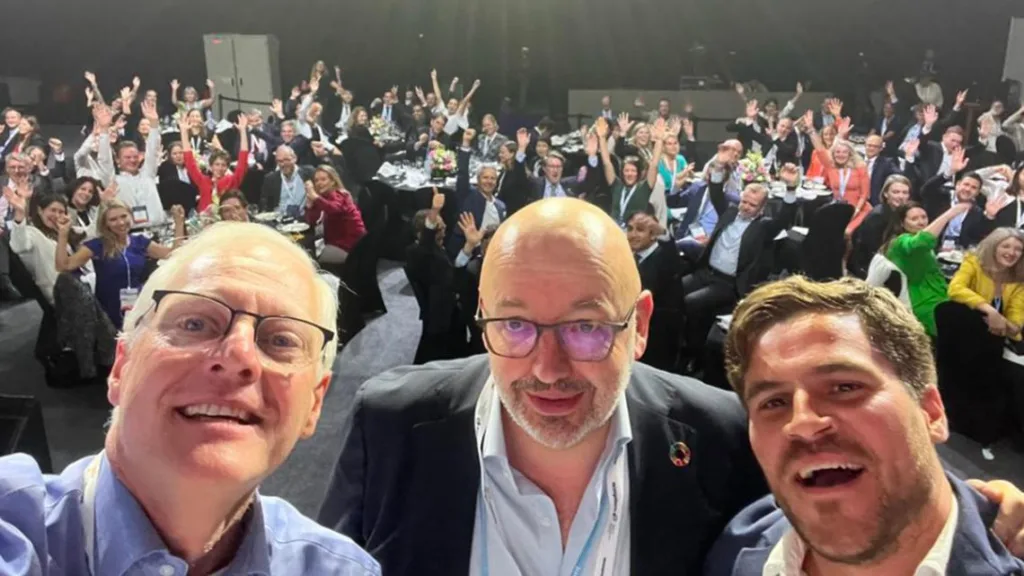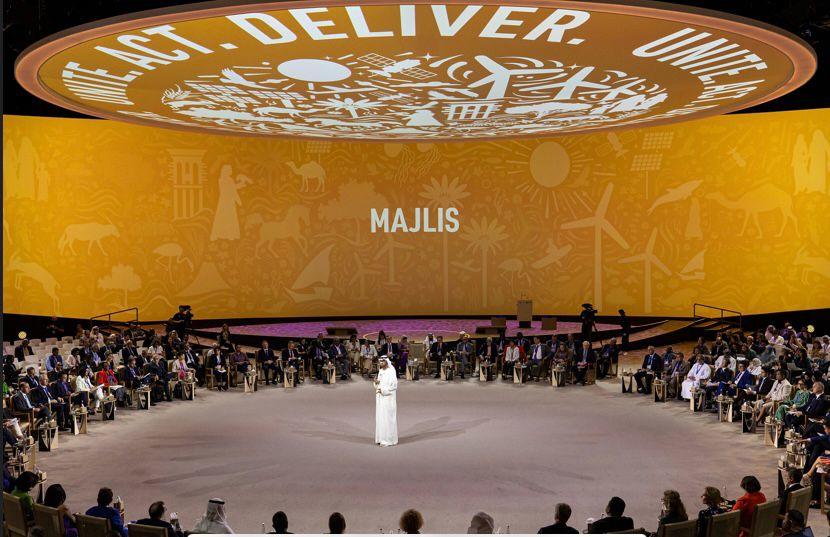Authors
Lewis Hill, Manager – Policy, Advocacy & Member Mobilization
On Wednesday, 13 December 2023, the President of the 28th Conference of the Parties (COP28), Dr Sultan Al Jaber, brought the gavel down on a fortnight of negotiations in Dubai. The headline package – The UAE Consensus – concludes the first Global Stocktake of the Paris Agreement.
The lead-up to COP28 was not without controversy. Campaigners vociferously opposed the appointment of an oil & gas executive to lead the global climate change negotiations, and leaked documents released a week before the summit indicated that the United Arab Emirates (UAE) planned to use its role as the host of the COP to strike new oil and gas deals in bilateral meetings with countries.
Despite the controversy, Dr Sultan Al Jaber and the COP28 Presidency delivered a final cover decision that includes language on the need to transition away from fossil fuels for the first time in a UN text.
The Beginning of the End for Fossil Fuels?
The section on ‘Mitigation’ sends a strong signal on the political will to transition energy systems to net zero by 2050.
Paragraph 28 recognizes the need for deep, rapid and sustained reductions in greenhouse gas emissions in line with 1.5 °C and calls on governments to contribute to a number of global efforts to accelerate the energy transition.
The line that has grabbed all the headlines is the call for a “just, orderly and equitable” transition away from “fossil fuels in energy systems, to achieve net zero by 2050 in keeping with the science”, with an acceleration of action this decade. While this is not the ambitious “phase out” language that the European Union (EU), Alliance of Small Island States (AOSIS) and other negotiating blocs had been advocating for throughout the fortnight of negotiations, and the language included only refers to fossil fuels in “energy systems”, there is now no doubt that the genie is out of the bottle.
The language agreed on a “transition away” from fossil fuels provides an opportunity for a continued push for ratcheting up to stronger levels of ambition on fossil fuel phase out at future COPs. But the language in this final cover decision is clear – there is no going back. As Simon Stiell, the Executive Secretary of the United Nations Framework Convention on Climate Change (UNFCCC) declared in his speech moments after the text of the Global Stocktake had been agreed upon, this is the “beginning of the end” for the fossil fuel era.
Elsewhere in Paragraph 28 are complementary calls to facilitate and accelerate the global energy transition. Governments are called on to triple global renewable energy capacity and double the rate of energy efficiency. At the same time, they are also called on to substantially reduce methane emissions before 2030, scale up zero- or low-emissions vehicles, and phase out inefficient fossil fuel subsidies.
The section on the energy transition is not without its loopholes, though. Paragraph 29 refers to the use of “transitional fuels” for energy security. This effectively leaves the door open for countries to continue expanding the use of gas, which the International Energy Agency (IEA) has highlighted is incompatible with the updated Net Zero Roadmap published in 2023.
Elsewhere, in Paragraph 33, the role of restoring, conserving and protecting nature for climate mitigation towards the goals of the Paris Agreement is recognized, in line with the Kunming-Montreal Global Biodiversity Framework. There is also a strong, positive reference to the 2030 global goal to reverse forest degradation and deforestation.
The role of food systems is also recognized for the first time in Paragraph 55, but only with regards to adaptation, as “sustainable agriculture, resilient food systems and nature-based solutions” are recognized as crucial to enhancing resilience, well-being and mitigating climate-related losses and impacts.
A Positive Nod to the Private Sector
What do Paragraphs 70 and 103 have in common? They both offer strong, positive nods towards the role of the private sector in global climate action moving forward.
Typically, UN texts are light on specifying the role of the private sector, and business is usually encapsulated within catch-all statements about Non-Party Stakeholders (for example, cities, civil society etc.) However, in the final cover decision, the role of the private sector is explicitly referenced in two key paragraphs.
Paragraph 70 recognizes the role of the private sector in investing in the transition and the need to strengthen policy guidance, incentives and regulation to facilitate the scale of investments required for the transition. It calls on governments to continue to enhance these enabling environments. This is a positive signal for the private sector, recognizing governments’ crucial role in providing the guardrails via a range of policy mechanisms to enable business and finance to operate effectively and finance the transition towards a net-zero future.
Turning to Paragraph 103, the text urges governments to strengthen cooperative action with the private sector to scale the deployment of existing climate technologies and foster innovation for the development of new technologies.
The role of the private sector in developing climate technologies, for example, solar, wind, electric vehicles etc. is well known, but this reference in the text is a positive affirmation of this role and goes further to encourage governments to work more closely with the private sector to scale the development and deployment of the climate technologies required for 1.5oC.
A Step Forward, But How Big a Step?
The outcome of the Global Stocktake is a step forward in the right direction. But how big a step?
While the language calling on governments to “transition away” from fossil fuels is a historic breakthrough for a UN text, it will feel like a downgrade for many negotiating blocs and advocacy groups who have been pushing for more ambitious “phase out” language since the conclusion of COP27 in late 2022.
A clear omission from the final cover decision is a set of clear timelines for the mitigation activities outlined in Paragraph 28 to guide the decarbonization actions of governments, and therefore, other stakeholders, including the private sector. Aside from the end goal of achieving net zero in energy systems by 2050, there is little reference to any indicative interim timelines (except for the sub-paragraphs on renewables and methane) – for example, to 2030, 2035 – and little indication of the scale of investment required to facilitate this transition.
This brings us to the Achilles’ heel of this text – the section on finance. Questions remain over how the energy transition will be funded, especially in emerging markets and developing economies, and how the financing required to achieve the transition outlined in the “Mitigation” section of this text will be raised. It is a strong likelihood that finance will be the next key battleground for the next two COPs. The delivery of capital will be crucial to bridging the current gap between government pledges and implementation on-the-ground.
The Action Agenda – Here to Stay?
Away from the Global Stocktake, the Action Agenda – or the non-negotiated track – was widely viewed as a huge success. It mobilized new private-public partnerships, launched new initiatives and coalitions, and raised capital on a scale that has never been seen before at a COP.
The non-negotiated track has grown significantly since COP26 in Glasgow, when the UK Presidency placed a strong focus on mobilizing commitments and pledges to net zero and launched specific initiatives on methane, deforestation and the energy transition. In Dubai, the COP28 Presidency took the Action Agenda to the next level, and given its success, it could likely become a permanent fixture at future COPs to provide a forum that focuses work outside of the negotiations, and in particular, engages and mobilizes the private sector.
At COP28, the launch of the Oil & Gas Decarbonization Charter brought together 50 companies representing more than 40 percent of global oil production committed to net-zero operations by 2050 at the latest, and ending routine flaring by 2030 and near-zero upstream methane emissions.
On the demand side – the Industrial Transition Accelerator – backed by $30 million from Bloomberg Philanthropies, will turbocharge industrial decarbonization projects across energy, heavy industry and transport by combining forces across business, finance, and public policy. WBCSD is a founding partner of the Industrial Transition Accelerator and will be represented on the Advisory Board by its Chair, and the CEO of Solvay, Dr Ilham Kadri.
Elsewhere, in Food Systems, WBCSD and Boston Consulting Group (BCG) will act as Co-Chairs of the Action Agenda on Regenerative Landscapes, launched at COP28, to scale regenerative agriculture practices on more than 160 million hectares by 2030.
The launch of these COP-to-COP initiatives and the growth of other COP-to-COP initiatives, most notably the Breakthrough Agenda, provide the private sector and other Non-Party Stakeholders with vehicles in which to focus efforts on implementation in the 11-month period outside of the COP process.
Finally, despite the lack of progressive text on finance in the Global Stocktake, capital was mobilized on an unprecedented scale at COP28. On the first day of the summit, the Loss & Damage Fund was agreed upon, with pledges to the fund totalling over $700 million at the time of writing.
As part of the COP28 Presidency’s Action Agenda, the UAE also pledged $30 billion to a new private investment vehicle Alterra, which will be used as first loss funding for new climate investments in emerging markets and developing economies. Given the catalytic nature of the fund, it is expected that the UAE’s initial pledge of $30 billion could trigger up to $250 billion of additional blended finance for climate projects in developing markets this decade.
What Comes Next?
The next 24 months will be critical. All eyes will turn to Baku and Belém – the hosts of COP29 and COP30, respectively.
In a sign of international cooperation and a desire to ensure the legacy of the COP28 lives beyond a fortnight of negotiations in Dubai, the UAE, Azerbaijan and Brazil have formed a troika to launch a set of activities under an initiative called the “Roadmap to Mission 1.5” to enhance international cooperation and enabling environments, to stimulate ambition in the next round of Nationally Determined Contributions (NDCs) to keep 1.5oC within reach.
In the final cover decision, all countries have been asked to come forward with updated NDCs in line with 1.5oC covering all greenhouse gas emissions, categories and sectors, within the next 15 months. The UN Secretary-General also plans to convene a special event inviting countries to present their updated NDCs.
It is clear that following the Global Stocktake, upgrading ambition to follow through on the agreement to transition away from fossil fuels, scale renewables, and invest in mitigation activities, in keeping with the science and in line with 1.5oC will be top of the agenda for governments before the rubber hits the road in Belém. Adaptation and nature will also be high on the agenda for the Brazil COP Presidency.
For the private sector, the next two COPs pose an opportunity.
The Global Stocktake recognizes the importance of business in both investing in the transition and deploying and innovating climate technologies to facilitate it. The Action Agenda also provides a forum for business to incubate, scale and launch new private-public collaborations and initiatives to drive forward its contribution to the transition in between COPs.
Building on COP28, and in anticipation of another milestone COP in Brazil in 2025, the global business community should think big and be bold.
One of the key barriers to business scaling climate action is the misalignment with financial markets. There is a lack of decision-useful information within the markets to adjust valuation models and deploy capital into businesses driving decarbonization, while business is not yet receiving the incentives it needs from the markets to scale decarbonization solutions. To address this, CEOs need to fully integrate climate-related risks and opportunities into their Corporate Performance and Accountability System (CPAS).
The appetite for business to partner with governments, to mobilize investments, and to scale climate technologies has never been greater. Public-private partnerships are critical to keeping 1.5oC within reach.
The world has taken stock of our progress, telling us that much more needs to be done. Business must grasp this new economic opportunity with both hands. The world is counting on it.
Read a summary of our main announcements during COP28 here.
Outline
Related
Content

COP28 and Beyond: From Pledges to Action, Nature Takes Center Stage in 2024
19 December, 2023

No time to waste, the only way is forward – COP27 and the accountable road to COP28
23 November, 2022

Governments and businesses unite to advance zero-emission vehicle adoption in India
21 February, 2023
